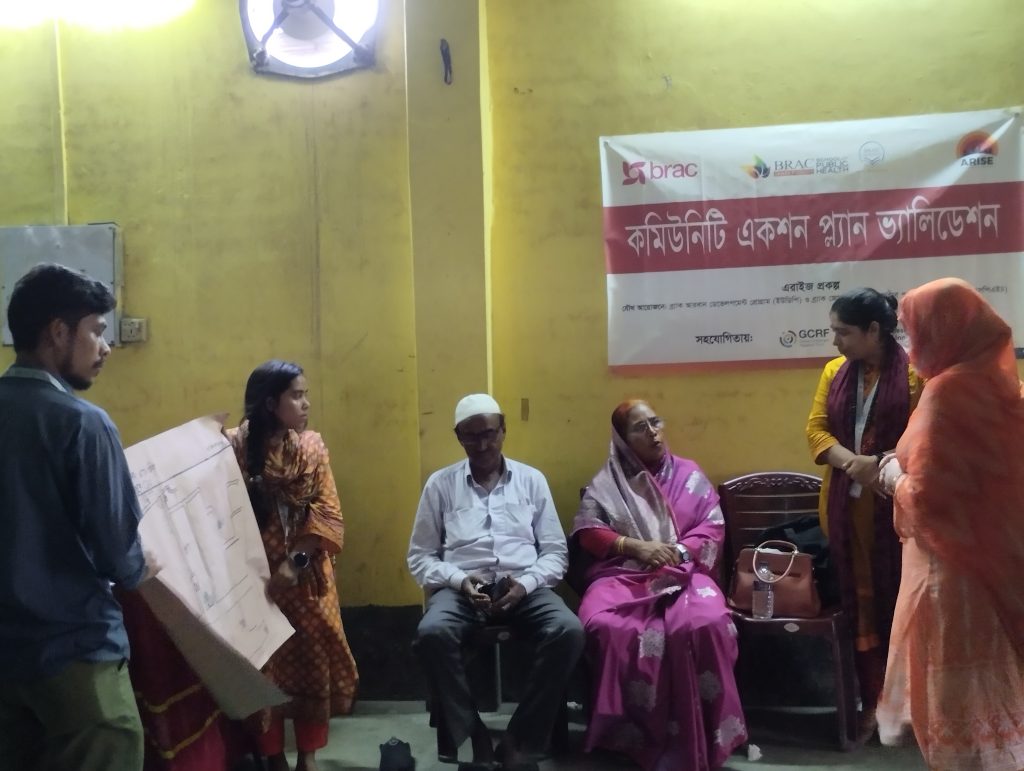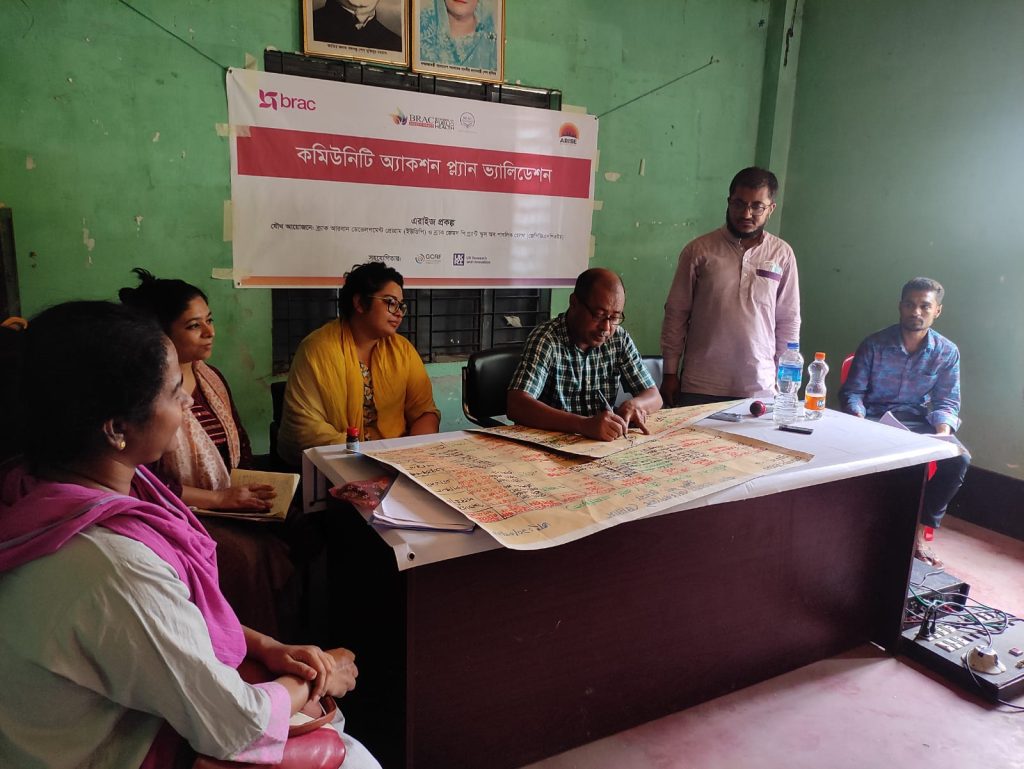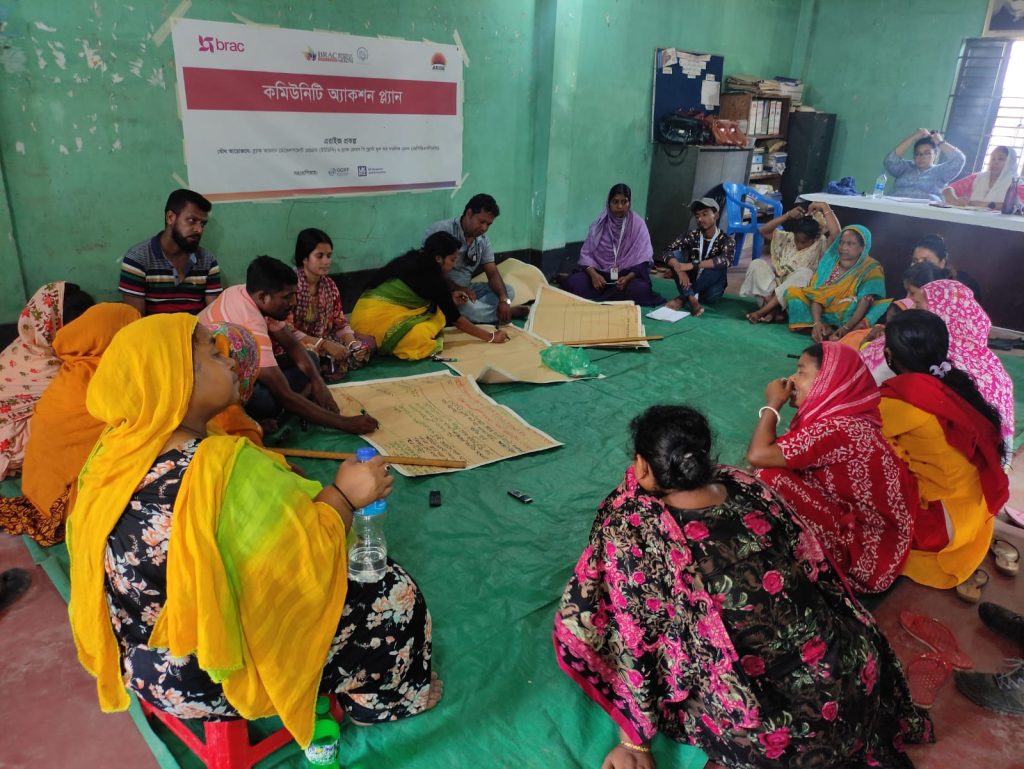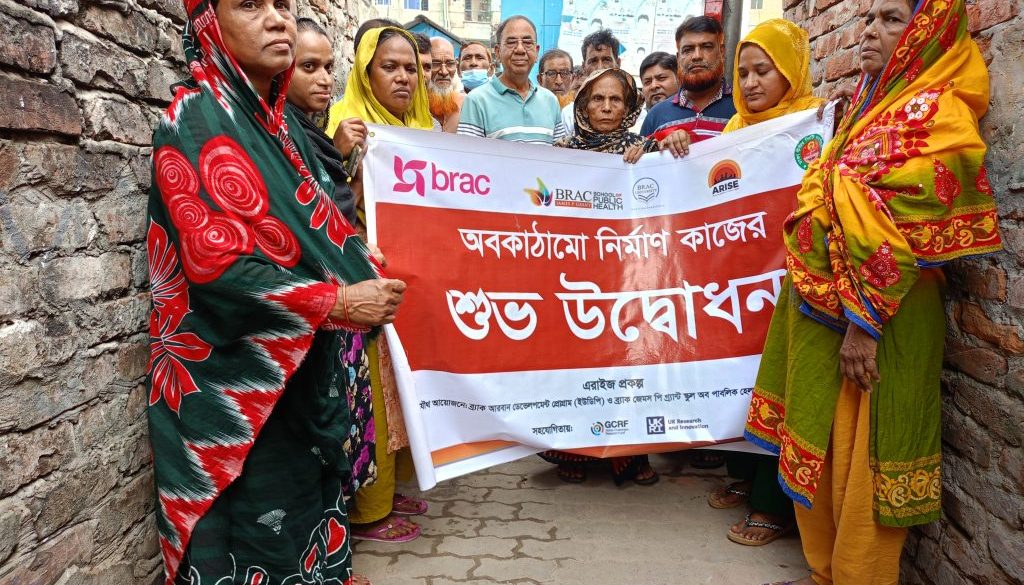IMPACT STORY: Co-production of community-led water, sanitation and hygiene interventions in informal settlements in Bangladesh
Authors: BRAC James P Grant School of Public Health, BRAC University, Bangladesh with the ARISE Consortium
In four informal settlements in Dhaka, Khulna and Satkhira cities of Bangladesh, ARISE partners BRAC Urban Development Programme and BRAC JPGSPH facilitated community action plans (CAPs) led by community members that led to increased ownership and empowerment of communities to advocate for their needs, as well as improvements to the water, sanitation and hygiene (WASH) infrastructure.
Background
Informal urban settlements in Bangladesh are characterised by unsafe water supply, inadequate environmental health services and substandard sanitation. Marginalised and vulnerable groups – such as children, young and adolescent girls, pregnant women, the elderly and people living with disabilities (PWDs) – face substantially more challenges. Despite universal access to basic water sources and over 80% access to shared improved sanitation in informal urban settlements, residents complained about foul smell/colour/taste, bacterial contamination, frequent unavailability, and sharing toilets (with on average 70 people) and long waiting times, along with a lack of accountability mechanisms.
To address these issues, the BRAC UDP, as a part of an ARISE Responsive Fund project, applied the CAP tool to support and facilitate the co-production of community-led WASH interventions in four informal urban settlements – Kallyanpur and Shyampur (in Dhaka), Greenland (in Khulna) and Itagacha (in Satkhira).
CAP is a participatory strategic planning tool that allows communities to actively take part in decision-making – identifying and prioritising problems and needs and deciding on a set of actions to address those issues.

CDO members present their Community Action Plan (CAP)
What happened
In each settlement, BRAC UDP worked with local community development organisations to implement the CAP process. Each community development organisation had 21 members, including influential community leaders, women, people with disabilities and young adults. community development organisation members played a key role in mobilising residents and represented their informal settlements as the voices of their community in meetings and forums with diverse stakeholders (i.e. formal and informal service providers, elected Ward Councillors (WCs), and Non-Governmental Organisations (NGOs) working in the communities).
Initially, several rounds of leadership training were held with community development organisation members, followed by consultation workshops with the community and stakeholders. Between May and July 2023, BRAC UDP and BRAC JPGSPH jointly arranged four CAP sessions with the community development organisation members, one each in Kallyanpur (Dhaka), Shyampur (Dhaka), Greenland (Khulna) and Itagacha (Satkhira) along with four validation sessions with key stakeholders, including the WCs.
In the CAP sessions, with BRAC UDP and BRAC JPGSPH facilitation and support, community development organisation members collectively identified the problems and possible solutions. Discussions revealed several socio-economic issues (unemployment, drug misuse, gender-based violence, child marriage and disease prevalence) and infrastructural issues (lack of reliable water sources, inadequate hygienic toilet facilities, waterlogging, inadequate waste disposal systems and lack of daycare facilities) in the informal settlements. The participants then prioritised their needs by voting, and BRAC UDP and communities jointly agreed on what areas of the WASH infrastructure needed improving and created a list of actions required.
The final CAPs were presented to the respective WCs to get their buy-in and support. Informal settlement residents seldom have the opportunity to articulate their needs to WCs, so these meetings marked a shift in power dynamics and established a conducive environment for them to assert their demands. With the support of the BRAC UDP and BRAC JPGSPH teams and BRAC’s legitimacy, WCs agreed to support them in solving these problems, approved the action plans and signed written endorsements in all areas, as a sign of their commitment and accountability to the community.
Additionally, WCs in all four sites committed to raising the issues in different relevant meetings and forums with Mayors, police, the Water Supply and Sewerage Authority and other NGOs.
Once approved, BRAC UDP assisted in implementing the identified prioritised WASH interventions through the ARISE Responsive Fund and created an enabling environment for the active participation of the community. Community members contributed 10% of the total cost needed for the WASH interventions in their area, and community development organisation members decided on suitable places for the infrastructure establishment, formed small committees to actively monitor and were involved in each step of implementation – from buying bricks and monitoring the construction workers to inaugurating the infrastructure with the WCs.
Once completed, the communities inaugurated the WASH infrastructures inviting the stakeholders to the events and in the presence of the WCs. BRAC UDP field colleagues also shared the CAP in the NGO coordination meeting.

The councillor signs the CAP as a symbol of acknowledgement after the validation session
Impacts
Throughout the CAP process, ARISE played the role of a catalyst between the community and stakeholders, in line with ARISE’s goals to enhance accountability and responsiveness. Impacts from the process include:
- Development of an advocacy tool: The CAP report acted as a reference of evidence for the community and local councillors to present the findings in City Corporation meetings, pursue NGOs and other duty bearers and advocate for their communities.
- Community ownership and sustainability: Joint implementation of need-based, context-specific WASH interventions through partnership between communities and service providers, active participation and co-financing by communities helped to ensure community ownership and long-term sustainability.
- Building trust: Interactions between the communities and the councillors established a sense of accountability and enhanced the relationship between community members and councillors.
- Empowerment of community members: A crucial accomplishment of this implementation activity was the empowerment and capacity development of marginalised communities to participate in decision-making processes and articulate their demands. “We are the guardians of this area, it’s our responsibility to prepare this plan correctly.” [CAP Participant, Kallyanpur]
- Improved inclusion: Active involvement of marginalised and vulnerable groups ensured their voices and priorities were reflected in the process. While overall there was an increased inclusion in the process, in some areas and on occasions, powerful men continued to dominate the conversation.
Lessons learned
- Co-production promotes an equitable approach: Involving community residents in the self-assessment of their needs and in decision-making represents a pioneering, meaningful and equitable approach. It allows feasible and context-specific solutions based on the knowledge and active engagement of community, NGO implementers and Government actors.
- The CAP process strengthens relationships: Periodic session-based collective activities (like CAP) by an organised platform (like community development organisations) proves to be mutually beneficial. When councillors endorse a plan, communities feel assured that their problems will be solved, and when councillors observe genuine community participation in the proposed plan, they feel a sense of accountability and satisfaction in taking action to meet the community’s needs. It also encourages community cohesion, allowing them to demand accountability from service providers and governance actors.
- Empowering the community is crucial: Empowering communities in decision-making enables them to articulate their demands, which is crucial for addressing their needs. It recognises that their rights and voices are acknowledged, considered, and incorporated when decisions are made in programmes and when shaping policies.

The community discuss and plan their WASH-based intervention with local leaders
What’s next
CAP reports continue to be used to seek support and accountability from key stakeholders. In Kallyanpur, the CAP identified the need for drains and roads in some areas. Through the ARISE project, two roads with drains were built, but more were needed. Community development organisation members have since used the CAP to approach a local NGO working in their community to build these additional drains and roads.
It is hoped that community members and key stakeholders will continue to develop their strengthened relationships to work together to address the challenges of their communities in an equitable and inclusive way.
Relevant resources
Rahman A. et. al. (2023) Water: A story of voice, agency, harmony and leadership among women in Itagacha, Satkhira in Bangladesh, ARISE Consortium https://lightcyan-tapir-564850.hostingersite.com/water-story-of-voice-agency-harmony-and-leadership-among-the-women-in-itagacha-satkhira-in-bangladesh/
Acknowledgements
Thank you to Nazia Islam, Louise Clark, Sweta Dash, Kate Hawkins, Jiban Karki, Leah Murphy, Anthony Mwaniki, Hayley Stewart, Joe Taylor and Sia Tengbe for developing and editing this output.
